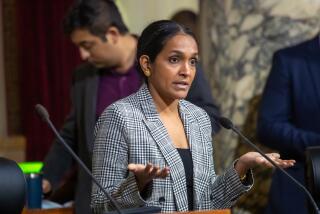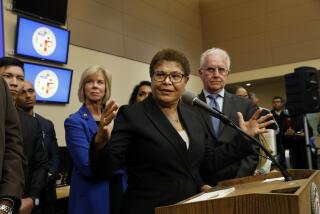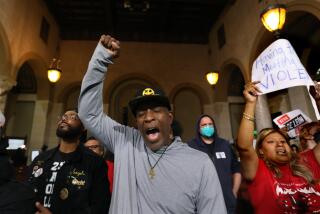Iraqi Council Flexes Muscles
- Share via
BAGHDAD — Seen by a distrustful public as a tool of the occupying powers, Iraq’s Governing Council is coming of age on the job as it tries to define a leadership to take over from the United States and its allies.
But as the 25-member body steers Iraq toward sovereignty, promised in a mere six months, it is acting like a defiant adolescent, challenging the authority and wisdom of those who gave it life. And its bargaining position has been strengthened by the Bush administration’s apparent eagerness to declare its mission accomplished before the U.S. presidential election.
No longer the passive instrument that U.S. civilian administrator L. Paul Bremer III used to carve the contours of a new Iraq, the council has become increasingly assertive, demanding control of the reconstruction purse strings and the authority to supplant Bremer’s vision with its own.
Council members complained that fledgling Iraqi security forces were not given the financial support or authority needed to combat insurgents. They prevailed in getting U.S. assurances that war crimes suspects -- jailed former leader Saddam Hussein first among them -- will be handed over to Iraqis for prosecution, despite pressure from some American circles to try them in an international forum.
On Monday, the council signed three mobile telephone service licenses, ignoring a Pentagon probe into allegations of corruption made by U.S. and Turkish companies that had been unsuccessful bidders.
The council began flexing its muscles last month when it undertook a review of Bremer’s gubernatorial appointments to each of Iraq’s 18 provinces. It deemed four of the governors unfit for office, firing one and starting procedures to replace the others. Council members are challenging such regional appointments by Bremer, insisting they are better acquainted with the needs and values of Iraqis than an American making personnel choices under deadline pressure.
Bremer wants the council to knuckle down to the task of drafting a Fundamental Law that will guide the country through 2005, by which time a constitution should have been drafted and ratified in a referendum and direct national elections scheduled to let Iraqis choose their new leaders. The council has only until Feb. 28 to deliver the complex law that will lay out electoral and governing procedures for the Transitional Assembly that will assume power from the coalition.
Instead, the council has delved into staffing the provincial governments. “The Americans can’t give the right judgments about our governors. We have to get that from the people in the street,” said Ahmad Shyaa Barak, a Shiite lawyer on the council.
“The provincial councils will play a big role in selecting the next leaders. It is not acceptable that they were appointed,” Barak said.
“We must make the necessary changes. It’s too important, regardless of the objections of the” U.S.-led Coalition Provisional Authority.
Bremer initially overruled the council’s November firing of Babylon Gov. Iskandar Jawad Witwit on grounds of corruption. But Bremer let stand a second council edict on Dec. 9 dismissing Witwit for membership in the outlawed Baath Party.
The coalition apparently calculated that to oppose the council would contradict the aims of the “de-Baathification” process as well as reinforce an impression among many Iraqis that the council is a puppet of the occupying powers. However, instead of placating the council, the battle emboldened it to insist on replacing other officials.
“Some of those appointed are not working out. They were bad choices,” argued Mahmoud Othman, a Sunni Kurd and a political independent. “After the war, things were done in a hurry. We have to make corrections before the next elections.”
Coalition officials are reluctant to publicly discuss what remains a behind-the-scenes clash over the appointments. One said only that probing regional councils would be time-consuming, and in the absence of reliable public opinion research, it would be difficult to accurately gauge any interim governor’s real standing with constituents.
Some council members suspect the coalition authority is protecting a few malleable governors so they can place figures in the next executive who otherwise might be unable to garner local support. For example, the Pentagon’s favorite ally on the council, Ahmad Chalabi, lived outside Iraq for 35 years and has no support base in the country.
Initially in lock step with Bremer on the shape of a future Iraq, the council has increasingly asserted its autonomy on financial and judicial affairs as well as appointments.
The council has won assurances that Hussein will be turned over to Iraqi custody to face trial here on war crimes. Council members have also dismissed allegations that the U.S. occupiers will wield a heavy hand in shaping the newly created Iraqi war crimes tribunal.
“The justices will be appointed by the Governing Council, not the CPA,” said Dara Noureddine, a former judge on the council who was jailed by Hussein for refusing to overturn a ruling against the regime.
Other council members have become resentful, at least in private, over Washington’s hurry-up campaign to extract itself from Iraq while refusing to relinquish power to the new Iraqi institutions.
“We feel very strongly that it is unfair to expect a process that needs two to three years to be done properly to be squeezed into six months,” one council member said. “But we have to agree to this. It’s a little ‘thank you,’ the least we are expected to do for a man who liberated 25 million people.”
While the council appears ready to accept Bremer’s conclusion that direct elections for the next leadership bodies are impossible due to time constraints, the proposed caucus system continues to be looked at askance by Iraq’s most powerful religious leader, Grand Ayatollah Ali Sistani. His threat to denounce the caucus method as illegitimate would probably dissuade many Shiites, who constitute more than 60% of the Iraqi population, from participating in the process.
Mouwafak Rabii, a Shiite council member and British-educated physician, insists that the leadership body taking over from the council in six months will have more credibility because it will be selected in a broadly representative forum.
Like most council members, Rabii believes the current leaders are not only eligible to run for the new positions but their experience with the initial phase of self-rule uniquely qualifies them for the next transitional team.
“They should play a pivotal role in the next leadership. They have expertise and experience,” Rabii said of his fellow council members. “You need continuity. We can’t have this idiotic American system of dumping everyone from their positions when a new president wins election.”
He agrees that the council has become more assertive as it evolves and predicts that Bremer and the Pentagon architects of the emerging Iraq will have to give way to Iraqis’ own vision.
“We started off wobbly,” Rabii said. “It was a new experience for us. We didn’t understand the concept of trading off. Compromise is a dirty word in Arabic.”
He bridles under criticism aired by Bremer in Washington last month that the council has been too slow to work through the tasks assigned it: appointing Cabinet ministers, ratifying budgets for 2003 and 2004, representing Iraq abroad, building up Iraqi security forces and starting work on a new constitution.
“We’ve done all of that. Where are the shortcomings?” the former exile said. “And we have done all this under occupation, when the CPA has ultimate authority, not us. If anybody has failed, it is the occupational authority.”
Nasir Chaderchi, a Sunni member of the council, warns that poor investment in Iraqi security forces could delay the hand-over of sovereignty and departure of U.S. forces.
“The Americans have done nothing to give the Iraqi institutions more authority,” said Chaderchi, the head of the National Democratic Party. “The Interior Ministry can’t hire one single policeman now because of an alleged lack of funds.”
Meanwhile, negotiations are underway between the Pentagon and the council on the number of troops that will stay on after July 1 and the powers they will have, council member Adnan Pachachi said.
“What is important is that they will then be here with our approval and under conditions on which we’ve agreed,” said Pachachi, who at 80 is the oldest and most respected member of the council. “We will no longer have occupational forces.”
Iraqis want a minimal foreign presence but fear they will be vulnerable to tribal and sectarian rivalries and attacks by foreign forces unless they have in place a well-trained police force, civil defense corps, border guards and standing army.
All those forces are being built up now, but their numbers remain a fraction of what both the occupiers and the occupied said would be needed.
In Baghdad, for instance, 7,500 police have been hired while the capital’s population needs 20,000.
“If the Americans want to leave, they have to first build up our security forces,” said Chaderchi, one of the few council members with no plans to run for parliamentary or executive office in the upcoming caucuses.
“For the time being we are too weak. Foreign terrorists can easily make Iraq their base. But all these problems could be resolved quickly if our coalition partners would remove the roadblocks.”
More to Read
Sign up for Essential California
The most important California stories and recommendations in your inbox every morning.
You may occasionally receive promotional content from the Los Angeles Times.














